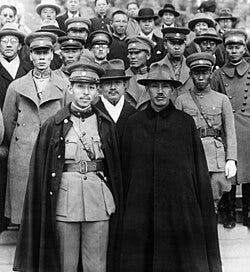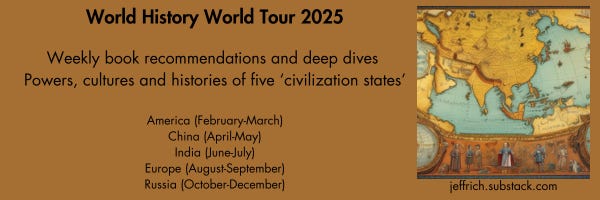Welcome to the fourth instalment of my eight-week deep dive into Klaus Mühlhahn, Making China Modern: From the Great Qing to Xi Jinping - China at war between 1931 and 1949. This deep dive series complements the China leg of my World History tour.
Overview of China at War
Japan began incursions into the disordered China from 1931. In 1937 full war broke out between an internally divided China and a pan-Asianist Japan, and after 1941 East Asia became a decisive theatre of a global war. The USA’s atomic bombs on Japan ended that global war in 1945. But within a year, civil war broke out between Nationalist and Communist forces. It became more than a civil war. It was the first proxy war of the Cold War. In 1949, the Communist forces won and founded the People’s Republic of China. The Nationalist forces retreated to Taiwan, where the USA continued its Cold War. Revolution and nationalism convulsed China during these wars. But one neglected act of defiance in Xi’an in 1936 changed the course of that history and expressed how China became modern.
Before We Dive In, Some Important News
I am doing a mid-year review of my Substack newsletter and how it ‘stacks’ with YouTube, my writing, and other programs. I want to simplify and improve your reading experience—three emails a week may be too much; one weekly email intuitively seems a better cadence. Yet I also want to keep my unique blend of world history, literature, and viewpoints from many cultures around the world, not just the West. The challenge is to find the right package, form, and frequency.
I will follow the country calendar for my World History World Tour—China now, India (June-July), Europe (August-Sept), and Russia (Oct-Dec). But over the next month, I will review the form and balance of the weekly book recommendations and deep dives.
With the Slow Read of The Books of Jacob, I have decided, after reader feedback, to increase the pace. From next week, I will do three chapters a week, plus the weekly features on context and character. The increased pace will mean the Slow Read of The Books of Jacob will finish by 16 June. Over that time, I will review the right format and platform for the Slow Reads, as well as my Nobel Literature Prize content.
I will keep you posted on these changes to ensure they meet your needs. I welcome any comments or suggestions you may have.
Over the next month on YouTube, I have some great interviews with KJ Noh, Warwick Powell and Pascal Lottaz, and a special guest with deep insight into the reality of being a foreign minister. I will also be concluding my series on the rise and fall of global empires. You will get highlights here on Substack first.
Today I also did a Live Stream on the USA’s Domestic Agenda drawing out some of the themes of my USA World History Tour.
Now back to the history of China at War.
The Forgotten Incident in Xi’an that Changed World History
In 1936 the pressure from Japan on both the Communist (CCP) and Guomindang (GMD) leaders was growing. Formally, they belonged to a United Front, brokered by the Soviet Union, to resist Japan. But Chiang Kai-shek was in fact pursuing an aggressive campaign to eliminate his rivals. The Communists had retreated during the Long March and were on the brink of destruction.
Zhou Enlai, second in command in the CCP, approached the GMD general Zhang Xueliang controlling Shaanxi and Gansu provinces in northern China. Zhou Enlai persuaded the general to lobby GMD leader, Chiang Kai-shek, to end the campaign to eliminate the communists and so unite against Japan. Chiang refused the general’s pleas and suspected that Zhang was delaying and resisting his orders to suppress the CCP.
On 4 December 1936 Chiang flew to Xi’an to prod his recalcitrant general into action. But Zhang Xueliang did not act according to Chiang’s plan. He reflected on a tradition of Chinese political thought, stunned his friends and foes, and strode into world history. He took Chiang prisoner. He kept him imprisoned for two weeks. Mao Zedong and Zhou Enlai prepared a treason show trial of the Nationalist leader, which could have ended in Chiang’s execution. Then at the last minute the ardent anti-communist was saved. Not by his later Western allies, Britain and the USA. He was saved by Joseph Stalin.
Klaus Mühlhahn, in Making China Modern: From the Great Qing to Xi Jinping, writes that
The Xi’an incident ended up having an impact on China and the world that would be hard to overstate. Few events in modern history have been such complete game-changers or had such enormous consequences. . . . Without the Xi’an incident, World War II would likely have taken a very different course, both in Europe and the Pacific.
(Mühlhahn, Making China Modern, p. 307)
How did this unpredictable human drama—in which Joseph Stalin played the good guy—change the course of world history?
The answer is below for paid subscribers in my deep dive into the chapter “China at War 1937-1949” into Klaus Mühlhahn, Making China Modern: From the Great Qing to Xi Jinping.




